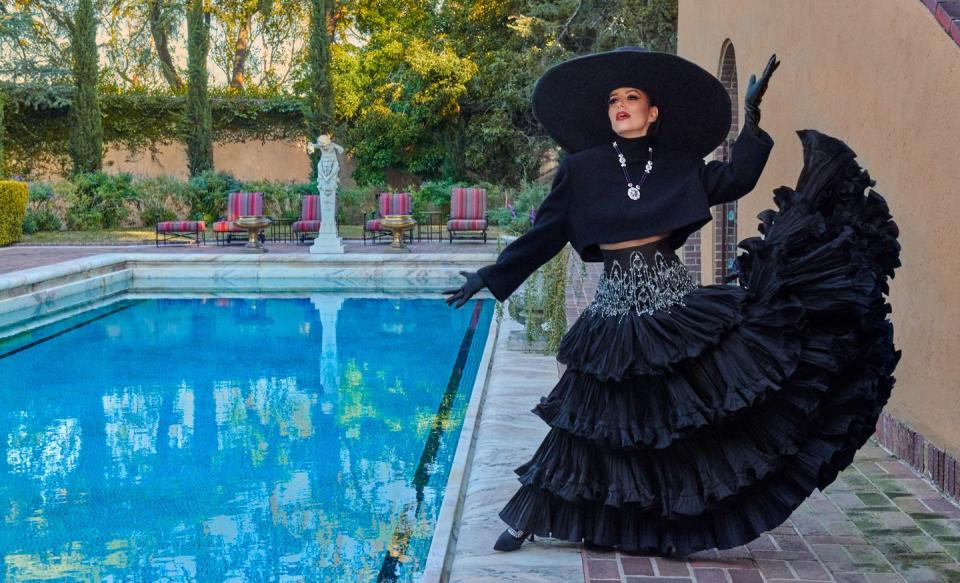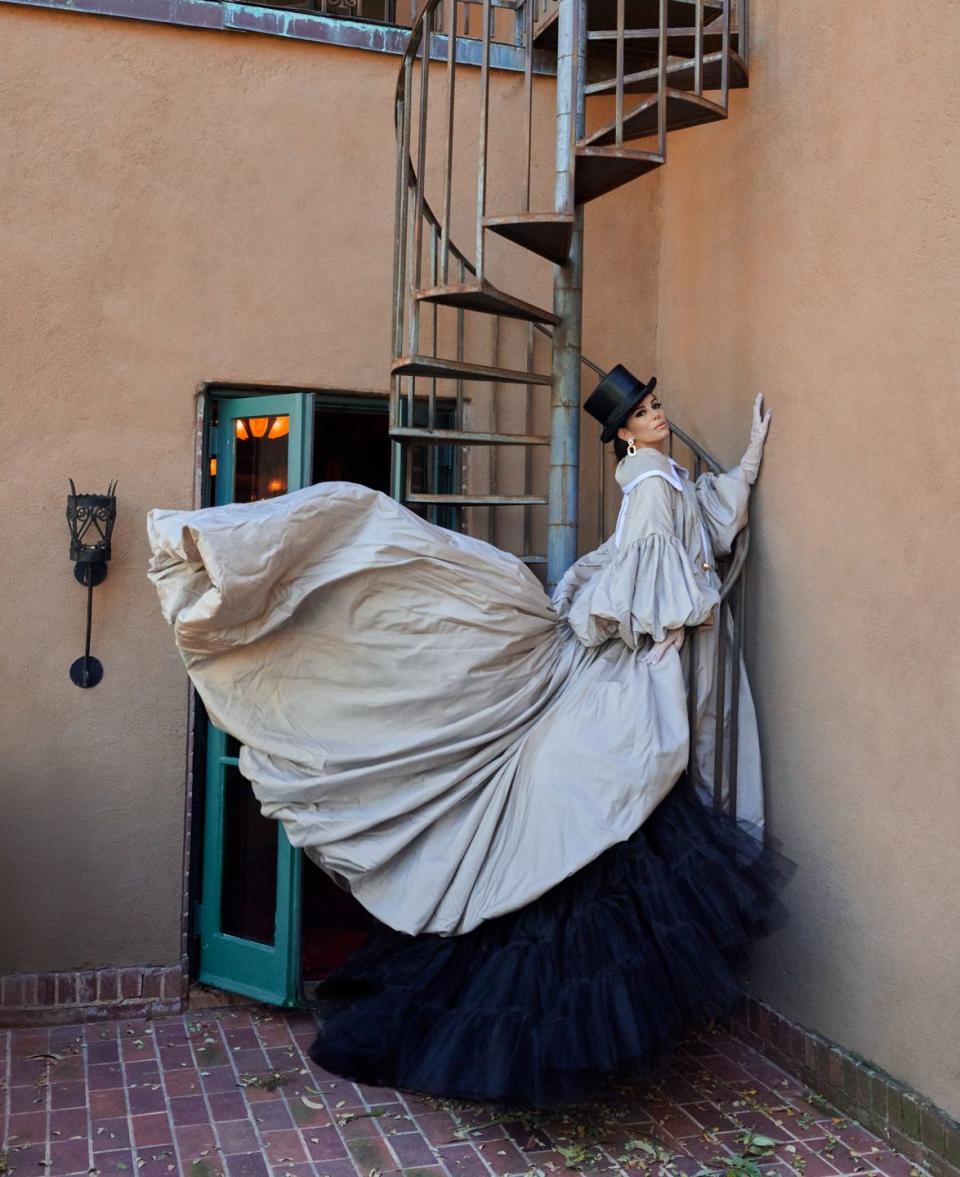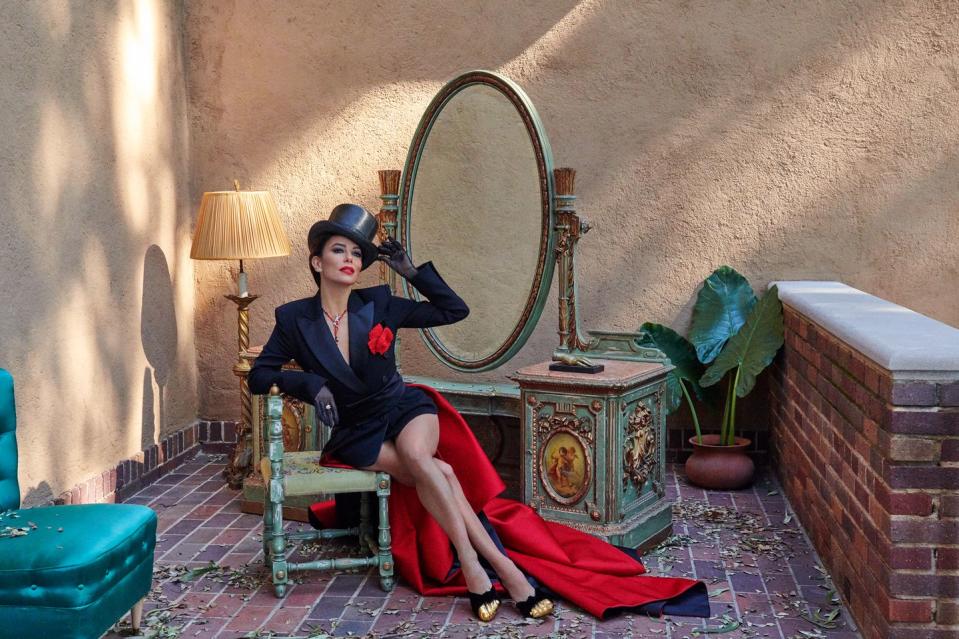Eva Longoria Was Never Desperate

"Hearst Magazines and Yahoo may earn commission or revenue on some items through these links."
Eva Longoria is miles and miles away from Wisteria Lane. She’s in Barcelona when we first speak. Well, an hour and a half outside the city, if we’re splitting hairs, but it’s all a bit of a blur. She’s been furiously hopscotching all over the continent for months, shooting a series for Apple TV+.
“I popped over to Paris. I popped over to Perpignan, to Marseille. I popped over to Lisbon,” she says, rattling off pit stops like a chipper Formula One champion. It’s 8 p.m. and she’s been up since 3 a.m. “I popped over to, you know, all of Spain.”
It’s a typical marathon for the actress. Except to call her just an actress is to overlook her quiet, steady rise as a producer, philanthropist, and political powerhouse. The Apple dramedy Land of Women, which sounds ripped from the universe of Pedro Almodóvar (and in fact co-stars his former muse, Carmen Maura), is one of a handful of projects Longoria has set up with every major player in streaming. She’s producing a children’s show for Disney+ and an adaptation of Isabel Allende’s classic novel The House of the Spirits for Amazon. Her feature film directorial debut, the spicy rags-to-riches comedy Flamin’ Hot, is set to open at the South by Southwest Festival and lands on Hulu and Disney+ on June 9. And then there’s the bread-and-butter work in front of the camera: She’s hosting Eva Longoria: Searching for Mexico, a travelogue co-produced with Stanley Tucci that was originally developed for CNN+ and survived the implosion of that service to land on the flagship cable channel. (Tucci’s eating-my-way-through-Italy show got the chop earlier this year, but Longoria’s premiered with much fanfare in March.)
Her busy year coincides with an inflection point in Hollywood. Streaming’s initial Babylonian gold rush is drawing to a close, executives sweat that they can’t splurge on deals anymore like overcaffeinated Sam -Bankman-Frieds, and, in the words of Janice Min, chief executive and editor in chief of the entertainment news company Ankler Media, “No one’s having any fun. Everyone is working a lot harder to make less with the same amount of money.” Yet, at 48, Longoria is neither desperate nor anxious. During her industry’s strange period of transition, she’s in the driver’s seat.

“I’ve never let my foot off the gas. I’m like, ‘Great, we got a show on the air. Where’s the next one? Great, we’ve got two movies being made. Where’s the next one?’ ” Longoria tells me this as if stating the obvious, Latino to Latino, Texican to Cuban. I grew up in Havana, she in Corpus Christi, but we share more than a common language. It’s the unspoken sense among outsiders, immigrants like me and even those born here, like her, that when everybody else is producing at 100 percent, we have to deliver at 150. “You can’t take your foot off the gas.”
For the better part of the last two decades, she hasn’t, even if it hasn’t always been easy to place where and when you’ve seen her. There she is during commercial breaks savoring every syllable of the phrase hyaluronic acid as a spokeswoman for L’Oréal. There she is on Instagram, stumping for Los Angeles mayor Karen Bass, wishing Jeff Bezos’s girlfriend Lauren Sánchez happy birthday, and dispensing lifestyle advice to more than 9 million followers. There she is at the 2016 Democratic National Convention, rather courageously admonishing then–presidential candidate Donald Trump: “My father is not a criminal or a rapist. He’s a veteran.” She has been indefatigable, in other words, about staying in the public eye without being in your face, certainly more than any actor to emerge from the 2004 television phenomenon that was Desperate Housewives. More, in fact, than any actor from any of the top-five rated shows on broadcast TV that fall season. (Remember anyone from CSI: Crime Scene Investigation? Remember broadcast?)
Then, the television landscape was dominated by the big four national networks, Netflix was a mail-order DVD rental business, and Apple’s hot product was the iPod Mini. Longoria, not yet 30, was an up-and-coming actress whose credits included stints in a soap opera and a Dick Wolf procedural. Desperate’s creator Marc Cherry wrote the part of Gabrielle Solis as a former runway supermodel. Then the five-foot-two Longoria came in. She was the first actress Cherry saw for the role, but he recalls thinking that they didn’t need to audition anybody else. I remember her as the only character on the show who seemed to be having any fun, usually with the gardener.

“Eva had this secret power that no matter what she does you like her,” Cherry says. “Not every actor you hand those kinds of lines to can do that. Eva could.”
The series became a global sensation, averaging 24 million viewers in the U.S., spawning several international spin-offs (and arguably the whole Real Housewives franchise), and returning the likes of Teri Hatcher and Felicity Huffman to the limelight. Second shots like the ones they got are rare in television, especially at that level, and the newcomer made sure to maximize her first. Within a year Longoria had founded a production company with a name that hinted at its megawatt aspirations, UnbeliEVAble Entertainment. Celebrity suited her like an Hervé Léger bandage dress. The youngest member of a Mexican-American family of six (Dad was an army base tool engineer, Mom a special education teacher), Longoria relished the visibility she could bring to causes that mattered to her. Friends say it’s that upbringing that accounts for her focus, then and now.
Henry R. Mu?oz III, the former finance chair of the Democratic National Committee, who co-founded the Latino Victory Fund PAC with Longoria, likes to tell an anecdote about a meeting they attended at the White House in the run-up to the 2012 Democratic National Convention. When Mu?oz pitched Julián Castro, then mayor of San Antonio and a rising political star, to deliver the keynote address, President Obama balked: “Nobody knows who he is.” Longoria jumped in: “With all due respect, sir, who knew who you were when you spoke at the convention?” Castro not only got a primetime audience, he was the lead-in to Michelle Obama.
“Eva’s not shy in the right moments,” says Congressman Joaquin Castro, Julián’s brother. “In an industry obsessed with protecting your brand and rarely taking risks, she has charted her own path. There are a lot of folks in Hollywood who do that, but in the Latino community, we just haven’t had many folks within the system. She has been perhaps the most powerful one.”
Longoria herself is not interested in being a candidate, though some Texas Democrats plead with her to take on Republican governor Greg Abbott. “I don’t want to be a politician, but I want to be political. Once you run for office, you have less power,” she says. When I mention that Latino voters, with growing numbers on their side, don’t seem to know how to exercise their power, she grows animated.

“Politically we’re a sleeping giant. In corporate America our buying power is a sleeping giant. In media we’re a sleeping giant. When are we waking up and taking a hold of that?” she says. “That’s why I started producing and directing. I wasn’t getting cast in things, and I was like, ‘Okay, I’m going to do this myself.’ ”
By the time Desperate Housewives wrapped up, in 2012, Longoria had been using its intense, fast-paced sets as a boot camp, showing up even on days when she wasn’t filming to shadow directors. It turns out the experience of starring in 20 or so episodes a year for eight years is a better film school than UCLA. “Eva came up in TV when it was write-them-shoot-them-ship-them. Boom! There was no time for extravagance. You can’t mess around,” says Cherry, who later co-produced the cable series Devious Maids with Longoria over four seasons. “Some people may be surprised to see all these things come about, but it’s the result of a lot of long-term planning.” As Longoria moved from a short film here to a pilot there to episodes of major commercial series, including black-ish, she could visualize the next stage of her career.
“As an actor, you really don’t have any power over anything. You stand on a mark. You say your line. You go home. You don’t cast who’s opposite you. You don’t get to pick the take you liked best or the poster,” she says, with the confidence of someone who now has a say over lots of things. “I want to control the final product of anything I do.”
Longoria’s pivot came against the backdrop of the entertainment industry’s own dramatic upheaval from legacy television to technology behemoths like Netflix, from talent to concepts and sequels and reboots.
“Some would argue that tech coming into Hollywood has done what Silicon Valley has done to other industries, which is increase scale at the risk of making many workers feel disposable,” says Min. “It’s like a treadmill of content at lower cost. For anyone who was raised in the older school of Hollywood, it’s crushing.” Cherry, who cut his teeth as a writer on The Golden Girls, blinked and suddenly, he says, “there’s, like, 500 TV series on.”
Longoria grasped that the ground was shifting and went to market armed with a product the streamers didn’t offer but needed badly: programming aimed at Latino viewers, the country’s largest non-white consumer group. She found a highly receptive audience. Her celebrity meant that she was a known entity in any room she walked into, and her years of directing television trained her to bring in productions on time and under budget. Jeff Zucker, the former president of CNN, had a $300 million war chest to launch CNN’s streaming arm, and Longoria was one of his splashiest gets.
“Eva has a huge following in both the Hispanic and non-Hispanic world, and, given CNN’s global footprint, it made all the sense in the world,” he says. “The business is changing, and you need to be able to adapt with it. Someone like Eva is not just a creative force but a sharp entrepreneur and business mind. That’s a rare combination.” Zucker notoriously departed WarnerMedia as it merged with Discovery, and his pet project, CNN+, was shelved three weeks after its launch. But Searching for Mexico is on the air through the end of April.

By last spring, when Netflix announced that it had lost subscribers for the first time in a decade, signaling the end of profligate spending on bingeable content, Longoria had already secured straight-to-series orders from Amazon and Apple. Like other stars whose production companies thrived during the bubble (Reese Witherspoon, Mindy Kaling, and Issa Rae are also prolific producers), Longoria had spied a clear lane on the yellow brick road, and she floored it. The current president of her production company is Sandra Condito, who worked alongside the filmmaker Robert Rodriguez and his ex-wife, the pioneering Latina producer Elizabeth Avellán, as they amassed a billion dollars at the box office with hit franchises like Spy Kids and Sin City.
“You know, people sometimes say, ‘I didn’t get the opportunity.’ Well, are you ready for it if it falls in your lap? I was 100 percent prepared,” Longoria says. She’s speaking with the luxury of hindsight, but it strikes me that she’s someone who is never not prepared. Even for our introductory Zoom, she was makeup-ready and on message, sporting a sweatshirt for a tequila brand, Casa Del Sol—her own. “I started where you’re supposed to start. I did the thing. I kept my head down and my feet moving for 10 years. What could I possibly creatively conquer next? It was the feature world.”
Flamin’ Hot is based on the 2021 autobiography of Richard Monta?ez, a Mexican--American marketing executive who claimed he had invented Flamin’ Hot Cheetos while working as a janitor at a Frito-Lay plant. It’s a classic Horatio Alger tale about a plucky underdog overcoming steep odds—How to Succeed in Business Without Really Trying sprinkled with chili pepper flakes—and it arrives at a time when films about beloved inanimate objects are all the rage (see: the Lego movie, the Barbie movie, the Nike movie by Dunkin’ ambassador Ben Affleck. Glazed Donut: The Movie is surely not far behind).

In truth, the snack was developed by a corporate team. So what? Is Cocaine Bear a documentary? Are there really banshees in Inisherin? Corners were cut. Details were fudged. Liberties, in industry parlance, were taken. Inspired is doing the heavy lifting in “inspired by real events.” Perhaps a movie about delicious corn puffs shouldn’t be scrutinized as if it were Ken Burns’s latest. Longoria was drawn not to the historical record but to a character not unlike herself.
“Ambition could be seen as a bad word,” she says. “But I have drive. Drive is a better word.”
While the rest of the entertainment--industrial complex braces for the next corporate shakeup and a looming writers strike, Longoria is in fifth gear. “The truth is the industry could make sure she never acts again because they could keep her busy the rest of her life as a director,” Cherry says. Mu?oz, who serves with Longoria on the board of the Smithsonian’s National Museum of the American Latino, gushes, “One thing I’ve learned is to never assume I know where Eva’s life is going to take her.”

So where does she go from here? I pose the question when I see her for breakfast at the Polo Lounge in the Beverly Hills Hotel, where she walks in with her arms full of her rambunctious four-year-old, Santiago (her only child; his father is Longoria’s husband José Bastón, a television impresario). She seems to be on a first name basis with every server. We’re gossiping about the upcoming Oscars and the best restaurant in Mexico City (Máximo Bistrot, by the way), but this being an industry canteen, the talk eventually turns to business. The lopsided economics of entertainment these days are especially clear to someone in her position, who 20 years ago might have made more in residuals from a single show than any combination of streaming series put together today could net.
“When you go to the streamers there’s no back end. The studios always owned the intellectual property, but you participated in it as a showrunner, as a content creator,” she says. “Now you don’t.”
Everyone I talk to shares a similar frustration with the state of play, and the more I hear it the more it sounds as if everyone in Hollywood is just now learning to hustle the way Latinos always have. “If you want something done…” she says, finishing my thought.
Longoria took matters into her own hands the second she could, and after a turn in the director’s chair gave her a taste of the future, she only wants more for her next act. Her template is film-makers like Rodriguez, who own the rights to their work and can monetize it, in perpetuity, however they wish.
“That’s the goal,” Longoria says with a glint in her eye. “You want to have ownership.”

Photographs by Ruven Afanador
Styled by Bernat Buscato
Hair by Ken Paves. Makeup by Elan Bongiorno. Nails by Ashlie Johnson at the Wall Group. Set design by Charlotte Malml?f. Production by ViewfindersLA
In the top image: Hermes pullover ($2,475) and skirt ($1,600); Cartier cuff watch ($82,500); Van Cleef & Arpels bracelet ($119,000).
This story appears in the April 2023 issue of Town & Country. SUBSCRIBE NOW
You Might Also Like
